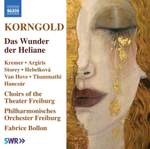|
Back
12/28/2018
Erich Wolfgang Korngold: Das Wunder der Heliane, opus 20
Annemarie Kremer (Heliane), Aris Argiris (‘The Ruler’), Ian Storey (‘The Stranger’), Katerina Hebelková (‘The Messenger’), Frank van Hove (‘The Gatekeeper’), Nutthaporn Thammathi (‘The Sword Judge’), György Hanczár (‘Fourth Judge’), Christoph Waltle (‘First Judge’), Pawel Trojak (‘Second Judge’), Andrei Yvan (‘Third Judge’), Jan Zadlo (‘Fifth Judge’), Jin Seok Lee (‘Sixth Judge’), Irina Jae-Eun Park, Narae Park (seraphic voices), Seraphic Voices Choir, Members of the Freiburger Bachchor, Bernhard Moncado (chorus master), Philharmonisches Orchester Freiburg, Fabrice Bollon (conductor)
A co-production with Südwestrunkfunk SWR
Recording: Rolf-Böhme-Saal, Konzerthaus Freiburg, Germany (July 20-26, 2017) – 161’37
Naxos # 8.660410-12 – Liner notes in English and German

   
To many, Erich Korngold’s name was synonymous with Warner Brothers’ swashbuckling film scores from the 1930s and the 1940s. One could hear melodramatic outpourings in such classics as Captain Blood, The Sea Hawk and The Adventures of Robin Hood, to name a few. And while Korngold could be defined as the ‘pre-eminent precursor to John Williams’ marvels’, his own fluency was heavily indebted to his operatic investments two decades earlier.
Earlier success with the 1920 opera Die tote Stadt embraced ideas of Expressionism that proved a catalyst for his subsequent Das Wunder der Heliane based on Hans Kaltneker’s mystery play Die Heilige. Thus, we find the opera’s paraphrase hovering around world redemption through a universal capacity for love. This notion sets up well in the preamble [“Vorspiel”] featuring Irina Jae-Eun Park and Narae Park and the Seraphic Voices Choir.
Korngold’s score is a kaleidoscopic thoroughfare of meticulously selected instruments. Tonal aspects prevail inside Heliane. Much of the beauty stems from effluent harp, twinkling celesta and endless string legatos and their ability to act as agents to seamlessly move the narration along from ‘one thought to another’ in bounteous array. Additionally, Korgold’s leitmotif never seems to be sidetracked, so the continuity breathlessly ticks away. Furthermore, it’s not hard to discern the music’s extravagances since Korngold studied composition under Alexander Zemlinsky. There is an effervescent transparency that acts like a miracle Masterlock © opening up to the hearts and souls of Heliane’s dramatic personae.
One hears Mahler’s melodic might commingled with grandeurs of Richard Strauss (i.e. Der Rosenkavalier and Ariadne auf Naxos) and stellar washes of Puccini fashion (i.e. Turandot and La fanciulla del West.) The streaks can be fast and mighty. Korngold even broke the window into Debussy impressionism, particularly during choral interludes reaching back to Pelléas et Mélisande.
From an orchestral perspective, Korngold’s score is pure joy: immensely rich and riddled with bullet-like precision as detailed by the Philharmonisches Orchester Freiburg. Much of the success can be handed to Fabrice Bollon’s conducting.
Where one finds dubiety is in occasional vocal glitches. The protaganiste premier, Heliane, is entrusted to Annemarie Kremer. Broadly speaking, the lyric dramatic soprano has a nice fit with a deeply bountiful timbre whose volumetric capacity can shatter the ceiling. The outreach is well suited to interact against Korngold’s hefty spots, though the higher reaches occasionally get chirpy and entrees have a bit of a steely shrill. Her showcase aria, “Ich ging zu im”, seems to breathe with splendiferous broadcast and garner irrepressible frisson; octave jumps cleanly connect without severance.
Continuing, there’s a stronger itch that dilutes Ian Storey’s ‘The Stranger.’ The dramatic tenor succeeds during piano and pianissimo segments, but vibrato projections frequently orbit out of alignment during clauses of louder and intense dialogues. Heliane’s husband, ‘The Ruler’, is tendered to Aris Argiris with restraint, giving the despot an evil overtone of credible declamation. Yet, similarly, as with M. Storey, his musical outreach jars with gradient gyration in the heat of the moment. Katerina Hebelková’s ‘The Messenger’ is penetrating, silky and lyrically touching.
Some of the most ravishing sections of Erich Korngold’s Das Wunder der Heliane are housed inside Act II. The friction which mounts between Heliane and ‘The Stranger’ becomes exceedingly gnawing and depth defying: think of sitting on the edge of one’s chair…when does the pressure finally end? We have moments of pull-back, but the strength regroups, regathers and strikes with spectacular power.
The foundation of this Naxos recording, captured in two Freiburg concerts, is incisive and magnetically scoping. This may not be the definitive recording, but Naxos makes a captivating attempt.
Christie Grimstad
|